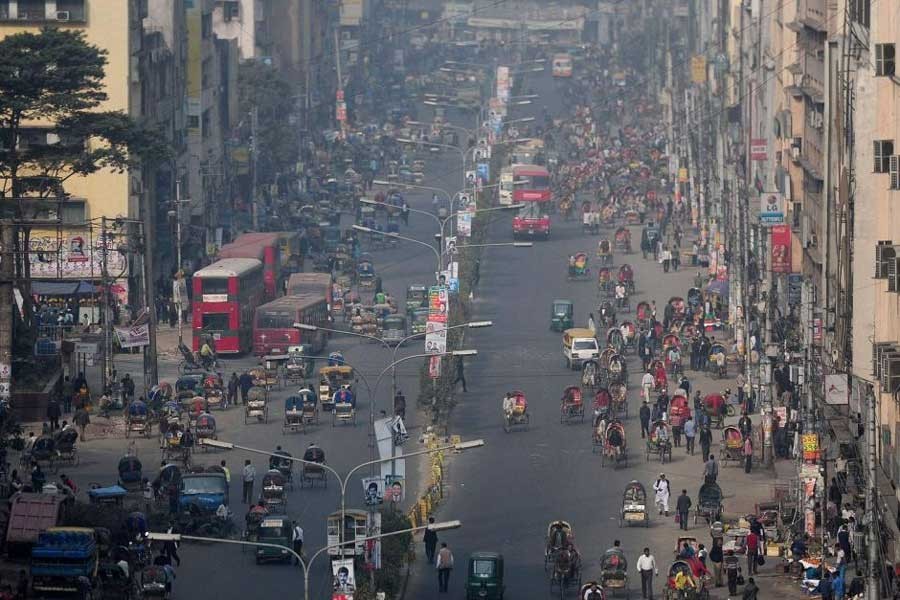Air pollution is taking a heavy toll on human life in Bangladesh. If left unchecked, the frequency of diseases linked to pollution and the number of deaths from those can affect economic growth of the country. Recent studies from two different international organisations have issued this warning.
The latest of the two is the World Bank (WB) report titled "Enhancing Opportunities for Clean and Resilient Growth in Urban Bangladesh: Country Environmental Analysis 2018". The report, launched this month, revealed that due to pollution and environmental degradation in urban areas, Bangladesh loses about $ 6.5 billion annually. This is about 3.4 per cent of the Gross Domestic Product (GDP) of 2015 of the country.
Pollution has reached such an alarming level that in 2015, it led to 80,000 deaths in different cities here. Across Bangladesh, 28 per cent of all deaths are from diseases caused by pollution, compared with a 16 per cent global average, the report says.
Only in Dhaka, the cost of pollution on account of lost labour output was $ 1.44 billion in 2015, around 0.72 per cent of the national GDP of that year.
Of the total economic losses, the air pollution cost $2.42 billion while household air pollution cost $1.27 billion, claims the analysis by the World Bank.
Another study styled "Global Air/ 2018", published in April of this year by the Health Effects Institute (HEI), mentioned that Bangladesh, along with Pakistan and India, have been suffering from sharp annual increase in air pollution since 2010. The global study claimed that 81 per cent population of Bangladesh are exposed to household air pollution from solid fuel burning.
Beside household air pollution, major sources of pollution also include brick kilns and construction sites. At the moment, there are 8,000 traditional brick kilns operating in the country.
The HEI report said that air pollution is the fourth highest cause of deaths among all health risks globally, after high blood pressure, diet and smoking. Persistent air pollution was the culprit behind premature deaths across mostly low and middle-income nations in Asia and Africa in 2016. Diseases linked with air pollution include strokes, heart attacks, pneumonia, lung cancer and chronic lung diseases.
Recently, British researchers found a relation between air pollution and dementia. Doctors, who tracked middle-aged and elderly patients for seven years, discovered that those living in the most polluted areas were 40 per cent more likely to have dementia.
The WB study blamed unplanned urbanisation and industrialisation behind increasing pollution. It claimed that environmental degradation like wetland encroachment and unregulated disposal of hazardous waste can lead to loss of IQ and neurological damage in children, and can increase the risk of miscarriages and stillbirths among pregnant women.
The report suggested that the government took steps to prevent encroachment and invest in and sustainably manage wetlands and canals. It also said that in order to achieve the upper-middle income status, Bangladesh must act now to tackle environmental degradation and pollution, especially in its cities.
It is time for the government, non-governmental organisations, environmentalists, other stakeholders and citizens to think about this crisis.
Fortunately, the government is about to frame a new Environment Policy that can make a difference. Its draft is ready for placing before the cabinet for approval soon. After that, the government hopes to enact a new law to try polluters, as Environment, Forest and Climate Change Minister Anisul Islam Mahmud told a function where the WB report was launched on September 16 in Dhaka.
The government is also planning to introduce an online monitoring system to oversee the operation of the effluent treatment plants (ETP) in the industries to enforce the law effectively.
Such a law has been the demand of environmental experts for more than a decade, as they feel that existing environmental laws are not enough to address pollution and punish polluters.
Once the new law is drafted, the government will be able to set strict rules, prohibiting air pollution caused by building construction, open earth cutting, traditional brick kiln operations, household pollution mostly in rural areas and other sources.
Apart from legal provisions, there is need for raising awareness of the ill effects of pollution among the general public. Conscious citizens can take individual and collective initiatives to check air pollution in their communities.


